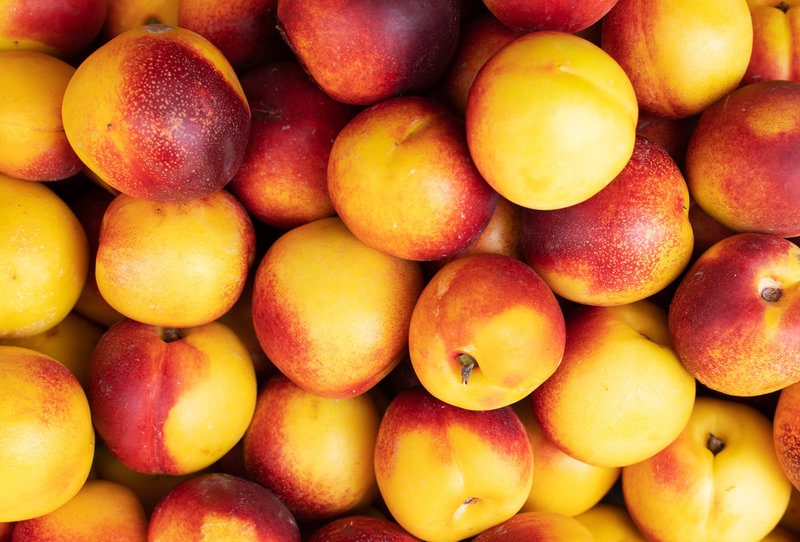Sweet to the taste buds and pleasant to the eyes, nectarines are everyone’s delight in summer. You could even mistake it for an apple if you don’t know it well. But as delightful and delicious as this fruit is to humans, can dogs eat nectarines?
Of course! Dogs can eat nectarines, though only in moderation. This fruit is rich in vitamins and minerals that can significantly boost your canine’s health. However, because its sugar content is considerably high, dogs cannot eat plenty of it at a time without having tummy issues.
Apart from sugars, nectarines contain fibers, which many dogs cannot easily digest. So, let’s kickstart by checking out the health benefits of nectarines to dogs. Among other things, this article explores the unexpected health benefits of nectarines to dogs. You’ll also learn the part of this fruit that dogs must not take.
How Many Nectarines Can A Dog Eat?

The quantity of nectarine a dog should eat depends on its size. A small dog should not exceed a slice per day; a medium breed can take one and a half slices, while a large breed can take two.
The reason for having this cautious amount is that nectarines contain plenty of fibers and high sugar content. So, if your pups take this fruit in large quantities, they can develop stomach upset or any of the diseases associated with too much sugar.
That’s why you must not allow your canine to eat this fruit unregulated. And no matter how small the quantity you give them at a time, it’s better to provide nectarines sparingly to your dogs. It shouldn’t be an everyday treat.
Dogs battling weight issues and diabetes should not eat nectarines; their sugar can worsen the condition, especially if taken regularly.
Let’s look at some of the possible side effects of dogs consuming excess nectarines.
What Happens If A Dog Overeats Nectarines?
Dogs’ excessive nectarine consumption can lead to gastrointestinal and digestive issues such as diarrhea, constipation, and vomiting. These issues are not because the summer fruit is toxic; they are because of the high sugar and fiber contents.
The sugar in nectarines can also cause tooth decay for your pups if you don’t clean their teeth regularly. And if your four-legged friend eats rotten nectarine, it may experience alcohol poisoning. That’s because fermented fruits produce alcohol.
Some of the symptoms you can notice signaling that your pup has eaten excessive nectarines include:
- Laying on its tummy almost throughout the day (probably experiencing stomach upset)
- Reduced activity
- Vomiting
- Loss of appetite
Most of these effects are short-lived and will resolve once you stop the nectarine. However, since you can avoid letting your furry companion go through this experience in the first place, it’s better not to go above board with this fruit.
How Does Eating Nectarines Benefit Dogs?

Dogs that eat nectarines are less likely to develop constipation and other digestive disturbances. That’s because the fiber in this summer fruit inhibits the explosive growth of non-beneficial bacteria in dogs’ digestive tract. It also promotes a healthy colon for pups.
Besides that, nectarines contain plenty of vitamins and minerals that bring about health benefits for your pooch. Let’s check out a few of these and what they offer dogs.
Vitamins A
According to the US Department of Agriculture, an average nectarine weighing about 5 ounces contains approximately 24.3 μg of vitamin A. This vitamin aids proper fetal development in female dogs and improves pups’ eyesight.
Vitamin C
Also known as ascorbic acid, this vitamin acts as an antioxidant in your canine’s body by helping to remove free radicals that can be dangerous if present in high quantities. It also boosts your dog’s immunity.
Magnesium
Approximately 13 mg of magnesium is present in 5 ounces of nectarines. This mineral helps your pooch absorb other nutrients and vitamins from food optimally.
Potassium
Potassium helps your dog’s kidney, muscles, and heart function properly, and it is present in nectarines in a significant quantity.
Copper
With nectarine, your pup’s skin and fur are on track for the nourishment they deserve. Copper is known to aid the growth of skin cells, which means that this mineral quickly replaces worn-out cells.
Besides the above vitamins and minerals, which are helpful to your dogs, nectarines also contain phenolic compounds, which several findings have suggested can reduce the risk of cancer in humans and dogs.
However, because of the sugar content of this fruit, you cannot afford to feed your pup a large portion of it. If so, how much nectarine is enough for dogs? Find out below.
Can Dogs Eat Canned Nectarines?
No, dogs should not eat canned nectarines. That’s because it contains preservatives and added sugars harmful to dogs. Some may even have artificial colorings and flavors, which can be offensive to dogs’ digestive systems.
Dogs’ digestive systems are not as permissive as humans’. So, you cannot simply give your furry friend everything you eat. Sugar is particularly a no-no to pups because of the many complications it is capable of causing.
The best nectarine for your pup is a fresh one. In fact, you must be sure that the one you want to give your dog is not rotten. If it is, it can be a source of alcohol poisoning that may necessitate a visit to the vet.
What Is The Best Way To Give Nectarines To Dogs?
The best way to give nectarines to dogs is to include them in their regular food or water. You could drop a slice or two in the water they drink or have it in any of their wet foods.
Nectarines that are not fully ripe are not appropriate for your dogs. It can lead to severe stomach upset for them because of the acidity. Again, you need to wash the fruit thoroughly before preparing the juice because it can have some pesticides and external preservatives.
Remember to begin small if this is the first time you are trying this fruit with your canine. Even if this is not the first time, you cannot give a whole nectarine to your dog at a time. A small slice or quantity is OK.
You can equally make a puree alongside other fruits and vegetables, like blueberries, to further increase the nutritional components. Only treat your furry friend to this delicacy because of the sugar component.

Can Dogs Eat Nectarines With The Pit?
Dogs should never eat nectarines’ pits. These stone-like items can cluster in your dog’s digestive tract to form a blockage. Of course, that can lead to choking.
Besides, a nectarine’s pit contains a trace amount of cyanide, poisonous to dogs, especially small breeds.
Because of this, you cannot allow your dog to eat this fruit unsupervised. Your canine will inadvertently consume these “stones,” and you may have to deal with the effects.
Some of the symptoms of cyanide poisoning in dogs include drooling, expanded pupils, and vomiting. Once you notice these symptoms, you shouldn’t hesitate to see a vet.
Can Nectarine Give Dogs Diarrhea?
Yes, dogs can come down with diarrhea if they consume nectarine excessively. Diarrhea comes not because this summer fruit is toxic but because of its high sugar and fiber content.
Dietary fiber is suitable for dogs because it helps inhibit the growth of harmful bacteria in the intestine. However, when a dog takes too much of it, it cannot digest it effectively, which leads to diarrhea.





